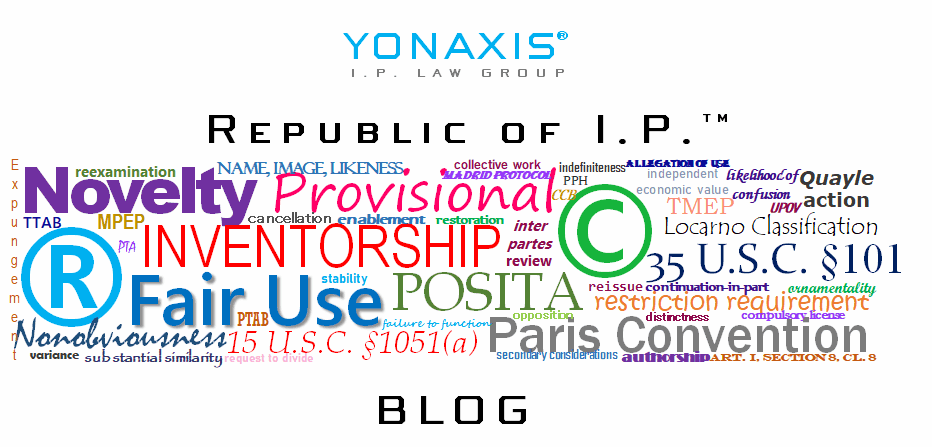On November 14, 2017, the USPTO issued its final rule on new fees for Fiscal Year 2017.[1] There are some marked increases, several moderate increases, some nominal increases, a few new fees, and some fees which have been eliminated altogether. The new fee schedule reflects a strategic goal for aligning fees to their associated costs …
Author: Yonaxis
The Slants’ Saga Ends: USPTO Registers Service Mark
On November 14, 2017, six years to the day after the application was first filed with the USPTO which precipitated the landmark U.S. Supreme Court ruling in Matal v. Tam[1] striking down the disparagement clause of Section 2(a) of the Lanham Act, the USPTO has registered THE SLANTS service mark in International Class 41 for …
USPTO Issues Final Rule on Patent-Agent Privilege
On November 7, 2017, the USPTO issued its long-awaited new rule extending the USPTO’s attorney-client privilege to registered U.S. patent agents. The final rule can be found here.[1] This new rule has long been wanted by patent practitioners because, up until now, there existed a gray area of the practice which potentially prevented clients from …
USPTO Designates Assignor Estoppel Case as Precedential Authority
On August 1, 2017, the USPTO designated a Patent Trial and Appeal Board case as precedential authority. This case was decided four years ago, on October 25, 2013. That case, Athena Automation Ltd. v. Husky Injection Molding System Ltd.[1], held that the doctrine of assignor estoppel is not an exception to inter partes review (IPR).[2] …
USPTO Issues Exam Guideline on Merely Informational Matter
On July 30, 2017, the USPTO issued an Examination Guideline 2-17 on Merely Informational Matter. The Guideline is meant to assist Trademark Examining Attorney on case law relevant to trademarks and service marks which can merely be considered informational in nature only, and do not function as a source identifier for a particular good or …
USPTO Issues Public Comments for §101 Subject Matter Eligibility
By Brent T. Yonehara On July 30, 2017, the USPTO released its §101 report, Patent Eligible Subject Matter: Report on Views and Recommendations From the Public. The report is a rather dry recitation of the §101 legal framework better suited for a Patent Bar Exam prep course. However, there is an interesting comparative overlay of …
Fed Circuit Watch: Litigation Misconduct and Inequitable Conduct
By Brent T. Yonehara On July 27, 2017, the Court of Appeals for the Federal Circuit decided Regeneron Pharmaceuticals, Inc. v. Merus B.V. In Regeneron, the Federal Circuit affirmed a district court’s finding that Regeneron’s patent 8,502,018 was unenforceable due to inequitable conduct.[1] This case brings up the Therasense New Order of Inequitable Conduct in …
USPTO Issues Exam Guidelines Consistent with Tam Decision
On June 26, 2017, the United States Patent and Trademark Office issued an updated Examination Guideline 01-17, consistent with the recent Matal v. Tam, 582 U.S.___ (2017), ruling by the United States Supreme Court, and for which our analysis was the subject of a previous post. In that decision, the Supreme Court held that the …
SCOTUS Watch: Lanham Act’s §2(a) Disparagement Clause Struck Down
By Brent T. Yonehara On June 19, 2017, the U.S. Supreme Court finally, and somewhat as expected, handed down its ruling in Matal v. Tam (formerly Lee v. Tam).[1] By a unanimous vote, the Supreme Court struck down the Lanham Act’s §2(a) prohibition on registration of disparaging trademarks as a violation of the First Amendment’s …
SCOTUS Watch: Cert Granted in Oil States: the Constitutionality of IPR Proceedings
By Brent T. Yonehara On June 12, 2017, the U.S. Supreme Court granted the petition for certiorari in Oil States Energy Services v. Greene’s Energy Group, LLC.[1] Of the three issues presented by petitioner Oil States, only one will be heard before the Supreme Court, namely: Whether inter partes review – an adversarial process used …
